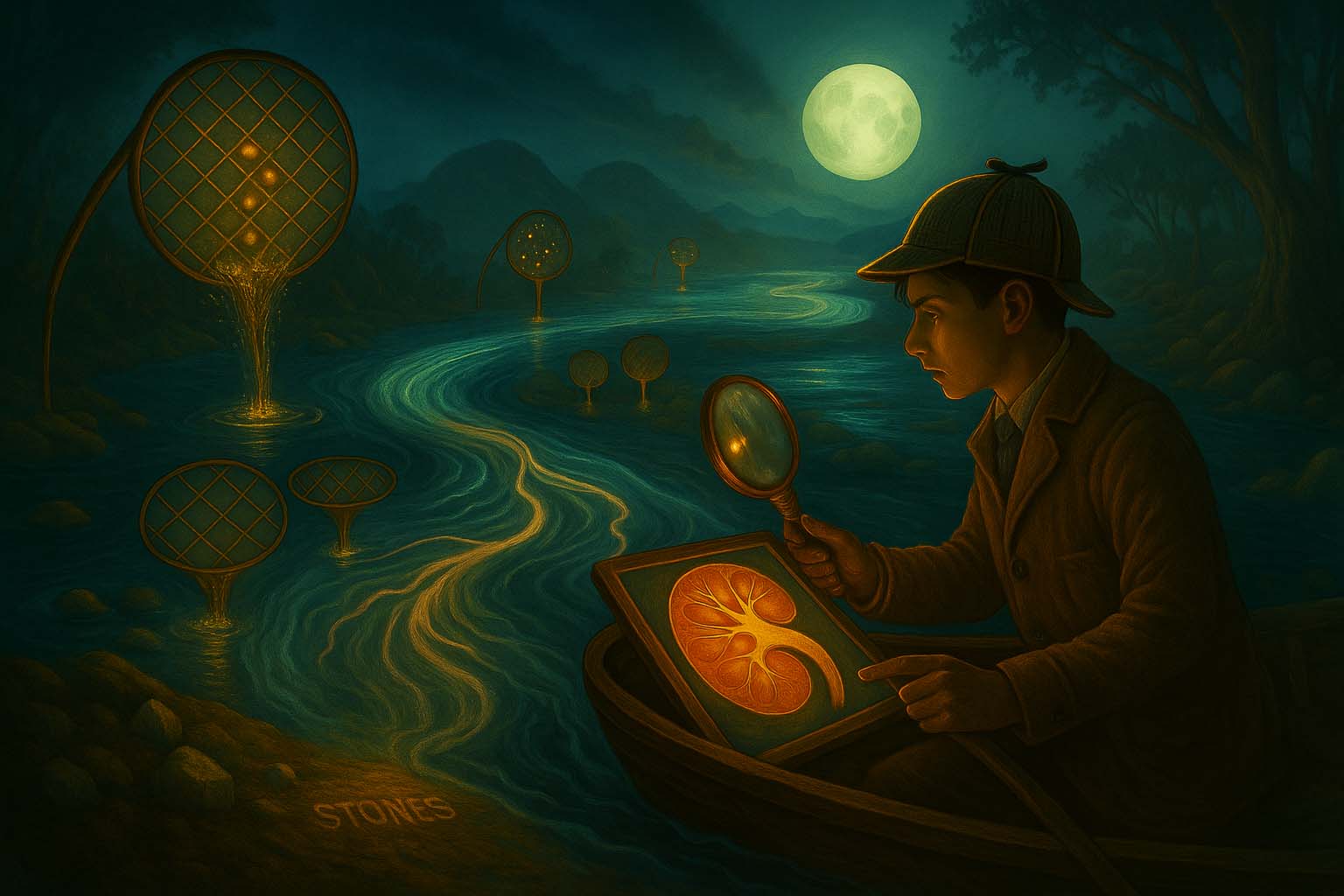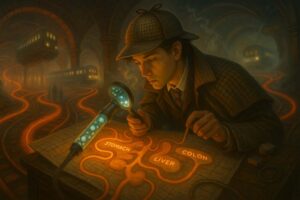
Nephrology
- Posted by admin
- Categories Organ & Systems Medicine
- Date May 23, 2025
- Comments 0 comment
The Filter Detective’s Domain – Cracking the Cases of Balance, Blood, and the Silent Signals of the Kidney
1. Introduction: The Scene of the Specialty
Step into the shoes of a Nephrology sleuth.
In this specialty, the trail is traced through fluid, filtrate, and function. Nephrologists are investigators of internal equilibrium—specialists in the slow unravel of salt, potassium, and acid-base secrets. They monitor filters that never sleep and balance that can tip with the smallest shift. Welcome to a world where swollen ankles, frothy urine, or rising creatinine are clues, and every litre retained or lost tells a story of systemic design—and dysfunction.
2. Key Mysteries They Solve (Common Conditions)
These detectives specialise in solving cases involving:
- Chronic Kidney Disease (CKD) – the creeping decline of filtration with wide-reaching impact.
- Acute Kidney Injury (AKI) – a sudden crash often masked by other crises.
- Glomerulonephritis & Nephrotic Syndrome – immune-mediated puzzles with protein trails.
- Electrolyte & Acid-Base Disorders – small shifts with serious consequences.
Each case requires a fine balance of fluids, numbers, history, and nuance—this is medicine measured in millimoles and millilitres.
3. Their Trusted Tools & Techniques
Every detective has their kit—and in Nephrology, tools may include:
- Urinalysis & Microscopy – the golden window into glomerular health.
- Renal Function Tests – creatinine, eGFR, urea, and electrolyte panels.
- Renal Ultrasound & Biopsy – visualising obstruction or confirming immune pathology.
- Dialysis Technologies – haemodialysis, peritoneal dialysis, and vascular access mastery.
This is internal forensics—reading what the kidneys whisper long before they scream.
4. The Charms of This Field: Why It Captivates the Curious
- Complex Interconnectivity: The kidneys touch every system—cardiac, endocrine, haematological, and more.
- Mathematical Precision: Interpreting labs and managing fluids is like solving puzzles with moving parts.
- Chronic Care & Relationships: Long-term dialysis or transplant patients build enduring partnerships.
- High-Stakes Reasoning: Seemingly small miscalculations can tip the entire system.
This is the specialty for those who enjoy taming the quiet chaos inside the blood.
5. Challenges: The Toughest Cases They Face
- Late Presentations – Kidney disease is often silent until advanced.
- Comorbid Complexity – Patients often have diabetes, hypertension, heart failure, or all three.
- Emotional Fatigue – Navigating end-of-life decisions, transplant rejection, or dialysis burnout.
- Resource Constraints – Dialysis access and organ scarcity complicate care.
But the seasoned nephrologist knows: sustainable care often lies in patient empowerment, not just intervention.
6. Famous Cases and Hallmark Clues
- The “Classic Presentation” – Periorbital oedema, frothy urine, and proteinuria: nephrotic syndrome.
- The “Zebra” – Rapidly progressive glomerulonephritis with crescents on biopsy.
- The “Aha Moment” – Realising NSAID use in an elderly dehydrated patient is behind their AKI.
7. Your Training Trail: How to Join the Investigation
To become a Nephrology detective:
- Start with a firm grasp of physiology—renal, cardiovascular, and metabolic systems must speak fluently to each other.
- Practise interpreting complex fluid charts and acid-base diagrams with precision.
- Train on dialysis units, learn transplant medicine, and understand pharmacokinetics in CKD.
- Build deep empathy and communication skills—long-term care is as emotional as it is clinical.
Whether managing a transplant recipient or correcting life-threatening hyperkalaemia, you’ll be balancing life at its chemical edge.
8. Final Words: The Signature of the Nephrology Detective
Nephrology detectives manage the mysteries of internal chemistry with quiet mastery.
They restore equilibrium when the body tips, filter meaning from millimoles, and stand with patients through years of treatment and uncertainty.
They don’t just treat kidneys—they track what flows through them and what fails when they falter.
So if you’re drawn to data, depth, and long-haul healing—
then this is your stream to follow.



